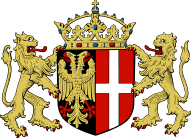 Neuss
NeussHistorisch
Former Jewish Graveyard
The Jewish community in Neuss emerged after all prohibitions for settlement by Jews were revoked under French rule at the beginning of the 19th century.
The former Jewish graveyard is first indicated on a map from 1829 in front of the Rheintor demolished in 1816. When consecrated, the Jewish graveyard was located on the banks of the Erft Canal – later developed into a harbour – close to the Lapp Brothers’ tile works. In the middle ages, one of the town’s execution sites as well as the infirmary and leper house with the Chapel of Saint Barbara were located in this area. As industrialisation progressed, the town became connected to the rail network and the harbour was developed, more and more industrial enterprises settled here – with the result that the graveyard originally surrounded by farmland ultimately found itself in the midst of industrial factories directly on the railway line or at the harbour.
In 1887, the Neuss Jewish community purchased grounds on the Glehner Weg opposite the new municipal cemetery founded in 1873.The new Jewish graveyard was also established here in 1890. Those buried in the graveyard on the Düsseldorfer Straße were reburied in 1920. Today, their gravestones occupy their own special place in the rear of the new Jewish graveyard. They are mostly engraved in Hebrew, some of them having undergone severe weathering. This corresponds to the Jewish concept of a graveyard as a place of eternity, where the deceased await the Day of Resurrection. Small stones can be found at or on the gravestones, which were placed here by visitors as a symbol of reverence according to Jewish tradition.
Sources and texts: Neuss municipal archives
Graphic design: Cornelius Uerlichs
Translation: A.C.T. Fachübersetzungen GmbH
This plaque was donated by: Bundesministerium für Familie, Senioren, Frauen und Jugend im Rahmen des Bundesprogramms Demokratie Leben!
sowie durch das Ministerium für Kinder, Familie, Flüchtlinge und Integration des Landes Nordrhein-Westfalen im Rahmen des Projektes Meine Stadt
, Gesamtschule Nordstadt Neuss, Raum der Kulturen e.V., Offene Tür Barabaraviertel
